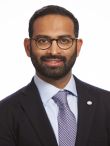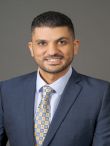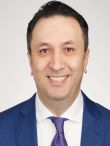Biographical Sketches of the 2025-2026 Candidates
Vice President
Sameer A. Ansari, MD, PhD
 Thank you! I am honored to be nominated for Vice President on the 2025-2026 SNIS Board of Directors.
Thank you! I am honored to be nominated for Vice President on the 2025-2026 SNIS Board of Directors.
Briefly regarding my education and current practice, I received my medical and doctoral degrees from Jefferson Medical College, Philadelphia, completed a diagnostic radiology residency at the University of Illinois, Chicago, and diagnostic/interventional neuroradiology fellowships at the University of Michigan, Ann Arbor. I have remained active in academics as a physician scientist, currently faculty as Professor, Section Chief of Interventional Neuroradiology in the Departments of Radiology, Neurology, and Neurological Surgery, at Northwestern University, Feinberg School of Medicine.
Serving the SNIS has been one of the most joyful and rewarding experiences for me over the last 15 years, collaborating with distinguished colleagues and friends. I have sought out multiple opportunities to be involved with the SNIS throughout my career; whether it was publishing/reviewing for the JNIS, being nominated for the SNIS Board as Member at Large in 2014 and Secretary in 2016, serving as the Program Co-Chair for the SNIS Fellows Course in 2015, working on the SNIS Annual Program Committee in 2016 (where we initiated the neurovascular anatomy lectures), serving on the SNIS Board as the Interventional Neuroradiologist Member at Large in 2015, serving on the Standards and Guidelines Committee from 2014-2022, the Health Care Policy/Economics Committee from 2016-2019, the SNIS/ABR representative to the CESAC (Credentialing Endovascular Surgery Advisory Committee) from 2019-2024, and most recently as Co-Chair of the SNIS Neurointerventional Oncology Summit in 2024-2025. However, it was my participation on the SNIS Board as the PSO Medical Director from 2016-2024 where I believe I contributed in the most meaningful way, initiating the NVQI-QOD registry integration between the SNIS and the AANS/NeuroPoint Alliance. I was able to direct its development into a modern neurointerventional registry database, facilitate its utilization for QA assessment, investigator initiated scientific studies, the NIH STEP clinical trials platform, the FDA DAISI program, and multiple industry vendors to assess the safety/efficacy of their neurointerventional devices.
If elected as Vice President, I would continue to promote the SNIS vision emphasizing its outstanding inclusiveness, and the numerous initiatives that have transformed the field of neurointerventional surgery for its providers and patients: the educational content/annual meetings, the JNIS journal, the SNIS Foundation grants, the neuointerventional fellowship match application process, and patient advocacy to name a few. In a Board leadership position and leveraging my prior knowledge/experience with the NVQI-QOD registry, a personal focus could be to expand this quality registry across the SNIS enterprise, which is a personal treasure with a significant potential to impact our field and patients. I would seek pathways for the greater adoption of NVQI-QOD across private and academic institutions, support quality research leveraging its massive sample size, and advocate for its utilization/expansion as a data entry mechanism for industry registries/trials, analogous to the NIH STEP clinical trial structure. I would explore grant funding mechanisms and industry opportunities in conjunction with the SNIS PSO Medical Director to support NVQI-QOD registry utilization. In addition, I would encourage greater visibility of the NVQI-QOD registry at our national meetings, through social media, and biannual newsletters/communications highlighting the QA projects of our PSO committees as well as publications/projects associated with the NVQI-QOD registry.
I humbly ask for your support and promise my due diligence in upholding your trust to navigate the SNIS over the next several years, maintaining it as the pre-eminent society that represents the interests of all neurointerventional surgeons.
Justin F. Fraser, MD
 It is an honor to be nominated to serve as Vice-President and future President for the Society of NeuroInterventional Surgery. It has been a privilege to serve most recently as Treasurer for the last two years. Serving on the Board over the last 9 years as Chair of Standards and Guidelines, Member-At-Large, Audit Committee Chair and now Treasurer, I continue to appreciate the collaborative nature of our Society, and its continued role in the advancement of Neurointervention. As Treasurer and Audit Committee Chair, I helped steward the financial investments of the SNIS. As a Member-At-Large, I had the opportunity to work on the formation of a Match process for Fellowship training in NeuroInterventional Radiology. We are seeing that process come to fruition, and I am enthusiastic the Match will help ensure the best training possible for our future colleagues. When I served as Chair of the SNIS Standards and Guidelines Committee, I led our team to continually gather and disseminate evidence-based information about contemporary techniques in our field.
It is an honor to be nominated to serve as Vice-President and future President for the Society of NeuroInterventional Surgery. It has been a privilege to serve most recently as Treasurer for the last two years. Serving on the Board over the last 9 years as Chair of Standards and Guidelines, Member-At-Large, Audit Committee Chair and now Treasurer, I continue to appreciate the collaborative nature of our Society, and its continued role in the advancement of Neurointervention. As Treasurer and Audit Committee Chair, I helped steward the financial investments of the SNIS. As a Member-At-Large, I had the opportunity to work on the formation of a Match process for Fellowship training in NeuroInterventional Radiology. We are seeing that process come to fruition, and I am enthusiastic the Match will help ensure the best training possible for our future colleagues. When I served as Chair of the SNIS Standards and Guidelines Committee, I led our team to continually gather and disseminate evidence-based information about contemporary techniques in our field.
With a background at the School of Public and International Affairs at Princeton University, I discovered early a desire to collaborate on policy aimed at improving healthcare. After graduating medical school and residency/fellowship at Cornell, I took a leadership role as Director of Cerebrovascular Surgery at University of Kentucky. While here at UK, I have served on multiple hospital committees and taken leadership roles for strategic planning, patient safety, philanthropy, and building design. While these have been rewarding from an institutional viewpoint, my work outside the hospital has been the most stimulating. For the last seven years, I have Chaired the Kentucky Board of Emergency Medical Services Cardiac and Stroke Subcommittee. A collaborative group of EMS providers, nurses, physicians, and administrators, it has set the policy for in-field triage of stroke, particularly ELVO, for our entire state. Through that process, I gained insight into the importance of multidisciplinary cross-talk and collaboration. Since then, I have sought other similar experiences, serving on the American Heart Association (AHA) Stroke Task Force for the Great Rivers Affiliate, on the AHA Stroke Neurovascular Intervention Science Committee, and as SNIS liaison to the AHA Stroke Scientific Statement Oversight Committee. I was honored to be named as one of the AANS/CNS CV Section Liaisons to the AHA International Stroke Conference Program Committee. I believe these types of cross-society interactions are a clear reflection of the responsibilities of an SNIS Board member.
Beyond my involvement with the Board, I have also maintained involvement in the organization of the SNIS Annual Meeting. I have been a member of the planning committee for many of the Annual Meetings, and was honored to the be the Co-Chair for the 2022 Annual Meeting in Toronto. I have also been a Co-Director of the SNIS Annual Fellows Course, assembling a curriculum that will interest and educate participants. It has been an honor to be involved with the Society in all these levels.
With that in mind, my vision for the future of SNIS would be to continue and strengthen cross-society collaboration both in the US and internationally. This would entail leadership on both large and smaller scale. For example, the SNIS should endeavor to provide speakers to neurointerventional societies throughout the world, creating a presence at major meetings, and showing support for the advancement of neurointerventional care worldwide. In addition, creating a speakers’ database will be extremely helpful to providing speaking opportunities to a diverse group of practitioners. Another vital role the SNIS can play in the future is as conduit for cutting-edge research in our field. Already, the JNIS is a seminal publication in our field. Supporting the collaboration with the Journal is key. In addition, we should endeavor to provide the best possible modality, both through publication and through our Annual Meeting, for the dissemination of results from randomized clinical trials (RCTs) in our field. Neurointerventional has established itself as a highly scientific field with well-designed and well-performed RCTs. The support of this scientific rigor should be a major priority for the Society moving forward. In these areas, I aim to provide a steady hand of leadership for our field.
Treasurer
Jeremy J. Heit, MD, PhD
 It is my privilege to be nominated for Treasurer of the SNIS Board of Directors. In support of my nomination, I would like to briefly describe my background, current position as an Associate Professor of Radiology and, by courtesy, of Neurosurgery at Stanford, and service to SNIS.
It is my privilege to be nominated for Treasurer of the SNIS Board of Directors. In support of my nomination, I would like to briefly describe my background, current position as an Associate Professor of Radiology and, by courtesy, of Neurosurgery at Stanford, and service to SNIS.
I grew up in Colorado, and I attended the University of Colorado at Boulder between ski trips. I then completed my medical and graduate school training (MD and PhD) at Stanford University. After medical school, I moved to the Boston for an internal medicine internship at the Brigham and Women’s Hospital followed by a diagnostic radiology residency at Massachusetts General Hospital (MGH). During my time at MGH, I served as Chief Resident in Radiology, and I completed a year of sub-specialty diagnostic neuroradiology training. After completing my diagnostic radiology training, I returned to Stanford for a two-year neurointerventional surgery (NIS) fellowship. After completion of my NIS fellowship, I was recruited to join the faculty at Stanford, and I am currently an Associate Professor of Radiology and, by courtesy, of Neurosurgery at Stanford, the Chief of Neuroimaging and Neurointervention, and the Stanford NIS fellowship director.
My service to neurointerventional surgery, neuroradiology, and radiology extends beyond Stanford. I have been dedicated to SNIS, and in the past few years I have served on the membership committee, as co-chair of the annual SNIS fellows’ course (2020 and 2021), as the co-chair of the SNIS Annual Meeting (2022), and on the SNIS Board of Directors as the Member at Large (Radiology), and as the Education Chair (2022-2025). I serve on several other national committees with the American Board of Neurological Surgeons (CAST and RFP committees), the American Society of Neuroradiology, and the Radiological Society of North America among others. I have also consistently served on the annual meeting program committees for SNIS, the International Stroke Conference, the American Roentgen Ray Society, the American Society of Neuroradiology, the Radiological Society of North America, and the American Society of Functional Neuroradiology over the past four years.
In summary, I am honored to be nominated for Treasurer of the SNIS Board of Directors. Thank you for your consideration, and I look forward to working with all of our SNIS members to continue to promote our marvelous field.
Stavropoula I. Tjoumakaris, MD
 Stavropoula I. Tjoumakaris, MD is a Professor of Neurological Surgery and Radiology at Thomas Jefferson University Hospital, Philadelphia. She was appointed Interim Chair of the Department of Neurological Surgery, Chair of the University Faculty Affairs, Director of the Cerebrovascular and Endovascular Fellowship, Vice Chair of Operations for the Farber Neuroscience Institute and Director for the Neurosurgery Medical Clerkship. Dr. Tjoumakaris holds the distinction of being one the first female dual trained cerebrovascular and endovascular neurosurgeon in The United States. She received her undergraduate degree in Biology, Physics and Chemistry from Richard Stockton College of New Jersey, where she graduated Summa Cum Laude and was honored as Class Salutatorian. Dr. Tjoumakaris attended medical school at Jefferson Medical College, where she graduated with highest distinction. She was inducted into the Alpha Omega Alpha Honor Society and received numerous awards for academic excellence. Dr. Tjoumakaris subsequently completed her Neurosurgical Residency at Thomas Jefferson University Hospital where she also completed a fellowship in Endovascular and Cerebrovascular Neurosurgery an Neurocritical Care.
Stavropoula I. Tjoumakaris, MD is a Professor of Neurological Surgery and Radiology at Thomas Jefferson University Hospital, Philadelphia. She was appointed Interim Chair of the Department of Neurological Surgery, Chair of the University Faculty Affairs, Director of the Cerebrovascular and Endovascular Fellowship, Vice Chair of Operations for the Farber Neuroscience Institute and Director for the Neurosurgery Medical Clerkship. Dr. Tjoumakaris holds the distinction of being one the first female dual trained cerebrovascular and endovascular neurosurgeon in The United States. She received her undergraduate degree in Biology, Physics and Chemistry from Richard Stockton College of New Jersey, where she graduated Summa Cum Laude and was honored as Class Salutatorian. Dr. Tjoumakaris attended medical school at Jefferson Medical College, where she graduated with highest distinction. She was inducted into the Alpha Omega Alpha Honor Society and received numerous awards for academic excellence. Dr. Tjoumakaris subsequently completed her Neurosurgical Residency at Thomas Jefferson University Hospital where she also completed a fellowship in Endovascular and Cerebrovascular Neurosurgery an Neurocritical Care.
She is an active member with leadership positions in organized Neurosurgery and serves as the Chair of the Cerebrovascular Section of the Congress of Neurological Surgeons/American Association of Neurological Surgeons. She has been voted as Chair-Elect for the CNS/AANS Joint Guidelines Committee. She has served as Scientific Program Chair for the Cerebrovascular Section for CNS, AANS, and Joint Cerebrovascular Section and has organized and lectured on cerebrovascular topics in national cerebrovascular meetings at a national and international levels. She currently serves on the Editorial Board for Journal of Neurosurgery and for the SVIN AHA/ASA Journal. She is a member of the Endovascular Fellowship CAST Committee, reviewing and advancing national endovascular fellowship program applications. She is an active member of international Endovascular & Cerebrovascular societies, such as WLNC, LINNC Paris/Americas, ESMINT and EANS. She is also an author for the American Heart/Stroke Association Guidelines Committee, and co-authored the SAH Guidelines 2023 Update and currently Acute Ischemic Stroke 2025 Guidelines.
In SNIS, she has served as a Scientific Program Co-Chair for the 2024 Annual Meeting, Co-Director and faculty for the Annual Fellows Course (2023, 2024), Neurosurgery Member at Large, Member of the Scientific Program Committee for 3 years, Member of the SNIS Guidelines Committee, Annual Meeting Abstract Reviewer, JNIS journal reviewer, has given multiple invited lectures at the annual conference, and has participated as session moderator. In addition, she has lectured at the monthly SNIS Journal Club Webinars and has facilitated and promoted discussions on the support and advancement of Women In Neuroendovascular Surgery (WIN). With her active leadership positions in national Endovascular and Neurosurgical Societies, her goal as SNIS Treasurer is to facilitate financial growth with the SNIS, investment opportunities, expansion of the philanthropic and industry-sponsored educational endeavors and active collaboration in establishing guidelines in cerebrovascular patient management and advancement of the field. She wishes to promote collaboration and equal participation of all major divisions in our field, Radiology, Neurology and Neurosurgery both nationally and internationally. Her additional passion is to promote diversity and serve as a mentor for future generations of neuro-endovascular surgeons.
Dr. Tjoumakaris has been the recipient of numerous academic, educational and clinical awards throughout her career including the “Dean’s Award In Excellence in Education,” “Excellence In Surgical Teaching Award” as well as being recognized for outstanding clinical and basic science research projects at the Pan-Philadelphia annual research meetings. Dr. Tjoumakaris has authored 500 peer-reviewed articles in the field of Cerebrovascular Neurosurgery. She has a particular interest in evolving techniques in the endovascular management of stroke, cerebral aneurysms, arteriovenous malformations intra-arterial chemotherapy for retinoblastoma, robotic applications in Neurovascular Surgery and is currently involved in numerous clinical trials.
Secretary
Jonathan A. Grossberg, MD
 I am grateful and honored to be nominated for position of SNIS Secretary. SNIS has meant a great deal to me, both professionally and personally, throughout the course of my career. I have watched this organization grow in both membership as well as impact. The structure of SNIS has fostered multi-disciplinary networking, mentorship, and educational resources for its members, allowing our field to evolve and take on innovative and clinical challenges in the process. I have certainly benefitted from everything our Society has had to offer, and I look forward to giving back to the Society through my service as Secretary.
I am grateful and honored to be nominated for position of SNIS Secretary. SNIS has meant a great deal to me, both professionally and personally, throughout the course of my career. I have watched this organization grow in both membership as well as impact. The structure of SNIS has fostered multi-disciplinary networking, mentorship, and educational resources for its members, allowing our field to evolve and take on innovative and clinical challenges in the process. I have certainly benefitted from everything our Society has had to offer, and I look forward to giving back to the Society through my service as Secretary.
Following residency training at Brown and fellowship training at Emory, I joined the Neurosurgery faculty at Emory, where I am currently Professor of Neurosurgery and Vice Chair of Education. I serve as the Residency Program Director for Emory Neurosurgery, as well as the Associate Fellowship Director for the Emory INR Fellowship. As a clinician, I am committed to providing care for patients throughout the Emory Healthcare system as well as Grady Memorial Hospital, which is one of the largest and busiest safety net hospitals providing neurointerventional care in the country. I am also proud to have led the SNIS sponsored Get Ahead of Stroke campaign in Georgia.
I have been passionate about my involvement in SNIS ever since I became a member of the organization. Over the years, I have contributed to SNIS in various capacities, as a member of the program committee, the abstract review committee, the fellowship match committee, and the education committee. I also served as the Fellows Course Co-Chair in 2022, and the Annual Meeting Co-Chair in 2023. I currently serve on the SNIS board as the Audit Committee Chair.
I plan to bring the same enthusiasm and passion to the role of SNIS Secretary. My overarching goal as Secretary will be to help continue the growth of SNIS as the leading multidisciplinary society in our field, where the needs of all neurointerventionalists, no matter specialty or practice type, are met. To that ends, I hope that we can start a periodic census of the membership to better evaluate needs and opportunities so that the organization best represents its diverse membership. I believe this will allow us to also grow our membership and strengthen the structure of our organization.
Thank you for your consideration and support.
Justin R. Mascitelli, MD
 I am thrilled and honored to be nominated for Secretary on the Society of NeuroInterventional Surgery (SNIS) Board of Directors. Following Neurosurgical Residency/Endovascular Fellowship at Mount Sinai Hospital and Cerebrovascular Fellowship at the Barrow Neurological Institute, I have worked in the department of Neurosurgery at the University of Texas Health and Science Center San Antonio for the last 7 years and am currently serving as the Residency Program Director, Endovascular Fellowship Co-Director, and Chair of the Neurosciences for the Baptist Health System in San Antonio.
I am thrilled and honored to be nominated for Secretary on the Society of NeuroInterventional Surgery (SNIS) Board of Directors. Following Neurosurgical Residency/Endovascular Fellowship at Mount Sinai Hospital and Cerebrovascular Fellowship at the Barrow Neurological Institute, I have worked in the department of Neurosurgery at the University of Texas Health and Science Center San Antonio for the last 7 years and am currently serving as the Residency Program Director, Endovascular Fellowship Co-Director, and Chair of the Neurosciences for the Baptist Health System in San Antonio.
I have served and continue to serve the SNIS in several ways over the last 3 years including 2022-23 Neurosurgery Member At Large, active Chair of the Social Media Committee for the last 2 years, active Associate Editor for the Journal of NeuroInterventional Surgery (JNIS) for the last 2.5 years, active member of the Neurovascular Match Task Force, and active member of the SNIS Standards and Guidelines Committee. At the same time, I have maintained an ongoing role in the AANS/CNS Cerebrovascular (CV) Section, including 2020-2023 Member At Large, 2021-2023 Chair of the Website Committee, Co-Chair of the Communications Committee, Co-Director of the Introduction to Vascular Neurosurgery for Residents Course, and most recently Chair of Rules and Regulation/Bylaws Committee. Finally, I have served on Neuroendovascular Surgery Advisory Committee (NESAC), a subcommittee of the Committee on Advanced Subspecialty Training (CAST) of the Society of Neurological Surgeons (SNS), for the last year.
I have greatly enjoyed being able to work in both SNIS and CV Section, especially working on collaborative efforts such as CV Section integrating into the SNIS Annual Meeting and joint SNIS/CV Section Webinars. In my mind, the greatest strength of the SNIS is the multidisciplinary team, bringing colleagues from Neurology, Neuroradiology, and Neurosurgery all to the table to push the field forward. SNIS is also unique in its broad efforts that serve both its members and patients, including educational webinars, mentorship programs, data registries, stroke advocacy, and more. The next few years will be extremely exciting as we roll out the new Neurovascular Match and I have the potential to have a unique role serving as a bridge between SNIS and NESAC/CAST.
Thank you again for the opportunity to potentially serve as Secretary for SNIS.
Education Chair
Maxim Mokin, MD, PhD
 I am a stroke neurologist and neurointerventionalist at the University of South Florida with an academic appointment of Professor, Vice-chair of Research and Neuroendovascular Fellowship Director at the Department of Neurosurgery and Brain Repair.
I am a stroke neurologist and neurointerventionalist at the University of South Florida with an academic appointment of Professor, Vice-chair of Research and Neuroendovascular Fellowship Director at the Department of Neurosurgery and Brain Repair.
I joined SNIS as a senior member in 2012, and since then have been engaged in a variety of its initiatives including serving as a Secretary, Neurology Member-at-Large on the Board of Directors, Annual Meeting Co-Chair in 2023 and SNIS/CV section Fellows Course Co-Chair in 2022. I have served as an Assistant Editor of JNIS Technical Video section since its inception in 2019.
I am excited to serve as Chair of Education because this position allows creativity and opportunity to make a real difference in continuing to foster the culture of learning and education within SNIS and its partners. My goal is to grow and maintain SNIS’ multi-disciplinary nature where neurointerventionalists and other professionals of different backgrounds and levels of career and training thrive.
Jenny P. Tsai, MD
 I am an interventional and vascular neurologist at the Cleveland Clinic. I have served as a member of the SNIS Board of Directors since 2019. During this time, I helped turn a few bold ideas into initiatives: a Fellows-led committee, a culture that promotes growth through diversity, and a structured pathway into our field. They are now the YNIS, the Community Engagement Committee, and the Neurointerventional Fellowship Match. In 2024, you elected me as your Neurology Member-at-Large. This year, I am honored to be considered for the position of Education Committee Chair.
I am an interventional and vascular neurologist at the Cleveland Clinic. I have served as a member of the SNIS Board of Directors since 2019. During this time, I helped turn a few bold ideas into initiatives: a Fellows-led committee, a culture that promotes growth through diversity, and a structured pathway into our field. They are now the YNIS, the Community Engagement Committee, and the Neurointerventional Fellowship Match. In 2024, you elected me as your Neurology Member-at-Large. This year, I am honored to be considered for the position of Education Committee Chair.
If elected, I will continue supporting our continuing medical education, while spearheading efforts for new educational opportunities for our APP, technologists and nurses. I will facilitate the sharing of insights on practice-building, including in non-academic settings. And promote outreach to keep educating our communities, and our patients. I believe that the strength of the neurointerventional community and our society is built on the growth of its members. I hope to continue contributing to this growth, as your next SNIS Education Committee Chair. Thank you for your consideration.
Member-at-Large (Interventional Neuroradiologist)
Reade A. De Leacy, MD
 I am a board-certified interventional neuroradiologist and currently serve as Director of Neurointerventional Spine at the Mount Sinai Health System, and as an Associate Professor of Neurosurgery, Radiology, and Orthopedics at the Icahn School of Medicine at Mount Sinai in New York City where I am also co-director of the neuroendovascular fellowship.
I am a board-certified interventional neuroradiologist and currently serve as Director of Neurointerventional Spine at the Mount Sinai Health System, and as an Associate Professor of Neurosurgery, Radiology, and Orthopedics at the Icahn School of Medicine at Mount Sinai in New York City where I am also co-director of the neuroendovascular fellowship.
Throughout my career, I have been fortunate to work alongside outstanding colleagues in both clinical and academic settings, and I remain deeply committed to advancing safe, evidence-based care for patients through research, mentorship, and interdisciplinary collaboration. My involvement with the Society of NeuroInterventional Surgery (SNIS) has been a meaningful part of my career. I’ve had the privilege of serving in leadership roles including Secretary and Member-at-Large for Neuroradiology, where I’ve worked to support education, communication, and representation for our neurointerventional colleagues within the society.
As a member of the editorial board of the Journal of NeuroInterventional Surgery (JNIS), I also strive to contribute to the broader academic mission of SNIS by helping to promote thoughtful research, peer review, and innovation in the field.
I appreciate your consideration and would be honored to serve the SNIS community as Member-at-Large for Neuroradiology in 2025. I bring with me a deep respect for the multidisciplinary nature of our field. My goal is to represent and support neuroradiology colleagues while helping to foster the continued growth and unity of our professional community.
Emanuele Orru’, MD
 Dr. Emanuele Orru’ is a senior member of the Society of NeuroInterventional Surgery, which he joined in 2014. Trained and board-certified in Italy, the United States, and Canada, Dr. Orru’ brings a truly international perspective to the evolving field of neurointervention. His academic and clinical journey has taken him from the University of Padua to Johns Hopkins and the University of Toronto, and now to the Boston area, where he serves as a neurointerventional radiologist at Lahey Hospital & Medical Center.
Dr. Emanuele Orru’ is a senior member of the Society of NeuroInterventional Surgery, which he joined in 2014. Trained and board-certified in Italy, the United States, and Canada, Dr. Orru’ brings a truly international perspective to the evolving field of neurointervention. His academic and clinical journey has taken him from the University of Padua to Johns Hopkins and the University of Toronto, and now to the Boston area, where he serves as a neurointerventional radiologist at Lahey Hospital & Medical Center.
Throughout his career, Dr. Orru’ has worked closely with colleagues across all specialties within the neurointerventional community — interventional neuroradiology, neurosurgery, and neurology — and deeply values the unique strengths each discipline brings to the table. His leadership style is rooted in a passion for elevating others and fostering meaningful collaboration. This vision has guided his service within SNIS, including active roles on the Education Committee and the Annual Meeting Scientific Committee, as well as frequent contributions as faculty for webinars, the Fellows Course, and the Annual Meeting.
Looking ahead, Dr. Orru’ is committed to ensuring that the voice of Interventional Neuroradiology remains influential within SNIS leadership and throughout the broader neurointerventional landscape. He believes this background brings a distinct and essential perspective, emphasizing diagnostic integration, procedural precision, and longitudinal imaging-based care. As Member-at-Large, he would also work to build stronger international relationships between SNIS and peer societies across Europe, Asia, and Latin America, fostering shared educational initiatives, coordinated sessions at global meetings, and mutual support for young investigators. Dr. Orru’ views the role not only as a platform for representing his specialty with integrity, but as an opportunity to promote global connectivity, interdisciplinary dialogue, and the advancement of neurointervention through thoughtful innovation and collaboration.
Member-at-Large (Endovascular Neurosurgeon)
Ramesh Grandhi, MD
 The most meaningful progress in neurointervention happens when we work across disciplines, communicate openly, and harness our shared expertise. This spirit of collaboration lies at the heart of the Society of NeuroInterventional Surgery, whose strength comes from the diverse backgrounds and expertise of its members.
The most meaningful progress in neurointervention happens when we work across disciplines, communicate openly, and harness our shared expertise. This spirit of collaboration lies at the heart of the Society of NeuroInterventional Surgery, whose strength comes from the diverse backgrounds and expertise of its members.
At the University of Utah, I serve as Section Chief and Fellowship Director for Neuroendovascular Surgery, where I’m working with colleagues to foster a culture rooted in inquiry, support, and education. I’m committed to advancing research in the endovascular space—research that brings disciplines together and elevates care. I hope we can continue building a global culture of inquiry that strengthens both neurointerventional education and the care we provide to our patients.
My path has been defined by service—from my early years as a high school teacher to my current roles as educator, researcher, and clinician. I’d like to bring that same ethos to SNIS: to lift others, break down barriers to collaboration, and ensure our society remains at the forefront of innovation and multidisciplinary excellence in neurointervention.
As Member-at-Large, I will focus on building bridges—across generations, specialties, and continents. I’m especially committed to expanding opportunities for early-career neurointerventionalists to engage with SNIS, and to developing educational resources for colleagues in low- and middle-income countries, where shared knowledge can have transformative impact. I see this role as a chance to connect people, amplify voices, and help ensure SNIS reflects the future of our field.
Visish M. Srinivasan, MD

I am a cerebrovascular and endovascular neurosurgeon at the University of Pennsylvania. I’ve been actively engaged with SNIS since attending my first meeting as a resident over a decade ago—as a member, presenter, and frequent JNIS peer reviewer—collaborating across neurosurgery, radiology, and neurology in support of the society’s multidisciplinary mission.
I currently serve on the Website Committee and previously chaired the Social Media Committee for the AANS/CNS Cerebrovascular Section. In these roles, I’ve worked in close coordination with SNIS to align messaging and strategy across our shared neurointerventional goals. One key initiative I led was the creation and maintenance of a centralized, regularly updated database of all accredited neurointerventional fellowships—an effort that has helped unify information across the field and now serves as a valuable resource for the developing multidisciplinary match.
At Penn, I serve as Site Director for Neurosurgical Education and lead a translational research lab focused on device development and biologic modulation of cerebrovascular disease. My lab includes a diverse team of trainees, and I remain deeply committed to education across all levels—from students to fellows—both in and out of the operating room.
If elected Member-at-Large, I will focus on strengthening SNIS’s leadership in scientific innovation, reinforcing its role as the premier neurointerventional society, and advancing trainee engagement across disciplines. I hope to see SNIS continue working closely with the CV Section, especially through joint educational missions that serve both memberships. A new initiative I’d like to explore is fostering similar interdisciplinary collaboration with international societies—particularly in regions where neurointervention remains more siloed—so we can help expand access, dialogue, and shared growth worldwide.
Member-at-Large (Interventional Neurologist)
Mohammad El-Ghanem, MD
 Dr. Mohammad El-Ghanem, M.D., is a distinguished board-certified neuroendovascular surgeon and vascular neurologist based in northwest Houston and affiliated with HCA Houston Brain & Spine. He completed his medical education at Jordan University of Science and Technology, where he earned his medical degree before advancing to a four-year residency in Neurology at Rutgers University/New Jersey Medical School.
Dr. Mohammad El-Ghanem, M.D., is a distinguished board-certified neuroendovascular surgeon and vascular neurologist based in northwest Houston and affiliated with HCA Houston Brain & Spine. He completed his medical education at Jordan University of Science and Technology, where he earned his medical degree before advancing to a four-year residency in Neurology at Rutgers University/New Jersey Medical School.
Following his residency, Dr. El-Ghanem pursued further specialization through two prestigious fellowships: one in Vascular Neurology at Pennsylvania State University College of Medicine, and another in Neuroendovascular Surgery/Interventional Radiology at Rutgers University. He is triple board certified by the American Board of Psychiatry and Neurology in neurology and neurocritical care as well as the American Board of Vascular Neurology, showcasing his expertise in his field.
Dr. El-Ghanem is not only a skilled clinician but also an accomplished academic. He has contributed to over thirty publications and numerous abstracts and book chapters and has presented at various conferences throughout his career. His commitment to education is further evidenced by his active participation in research, clinical trials, and mentoring lecture series. Currently, he serves as a Clinical Assistant Professor at the University of Houston College of Medicine, where he is involved in training the next generation of healthcare professionals. In addition to his Directorship with HCA Northwest Neuroendovascular surgery and comprehensive stroke center, Dr. El-Ghanem has held multiple leadership roles, including being on the Medical Executive Committee at HCA Northwest Medical Center and serving as the Chairman of the Social Media Committee for the Society of Vascular and Neurointerventional Neurology. He has also demonstrated exceptional leadership in building comprehensive stroke centers and neuroendovascular angio suites, enhancing the infrastructure and capabilities for treating stroke patients. Furthermore, he serves as an Expert Physician Panelist for the Texas Medical Board, contributing his clinical expertise and insights to support medical regulatory standards.
Dr. El-Ghanem is dedicated to providing his patients comprehensive care, ensuring they understand their disease process and treatment plans. He firmly believes in a patient-centered approach emphasizing a multidisciplinary strategy to achieve optimal outcomes. His mission is to treat every patient with the same care and compassion he would extend to his own family members. Dr. El-Ghanem welcomes new patients and referrals, reaffirming his commitment to improving the lives of those he serves.
Shahram Majidi, MD
 I am a vascular and interventional neurologist and serve as Co-Director of the Neurointerventional Surgery Fellowship at the Icahn School of Medicine at Mount Sinai in New York. My research lab focuses on the pathophysiology of hemorrhagic stroke, brain aneurysms, thrombectomy techniques, and transvenous approaches for neuromodulation and brain-computer interface (BCI) applications.
I am a vascular and interventional neurologist and serve as Co-Director of the Neurointerventional Surgery Fellowship at the Icahn School of Medicine at Mount Sinai in New York. My research lab focuses on the pathophysiology of hemorrhagic stroke, brain aneurysms, thrombectomy techniques, and transvenous approaches for neuromodulation and brain-computer interface (BCI) applications.
Since my residency, I have been an engaged member of the Society of NeuroInterventional Surgery (SNIS), drawn to its commitment to scientific rigor, multidisciplinary integration, and leadership in the field. I have had the privilege of serving on the Education Committee and the Annual Meeting Committee, contributing to the society’s educational mission and academic programming. I currently serve as Vice-Chair of the Guidelines Committee for the Society of Vascular and Interventional Neurology (SVIN), where I work to develop evidence-based clinical practice standards.
My interest in joining the SNIS Board of Directors is rooted in a commitment to intersocietal collaboration on key issues such as practice guidelines, reimbursement and healthcare policy, and academic advocacy. I am particularly interested in fostering partnerships between SNIS and organizations such as AAN, AANS, ASNR, and CNS with the goal of promoting interest in neurointervention among medical students and residents across diverse training backgrounds.
It would be an honor to contribute to SNIS’s mission and strategic direction through service on its Board of Directors as a Member-at-Large (Interventional Neurologist).



